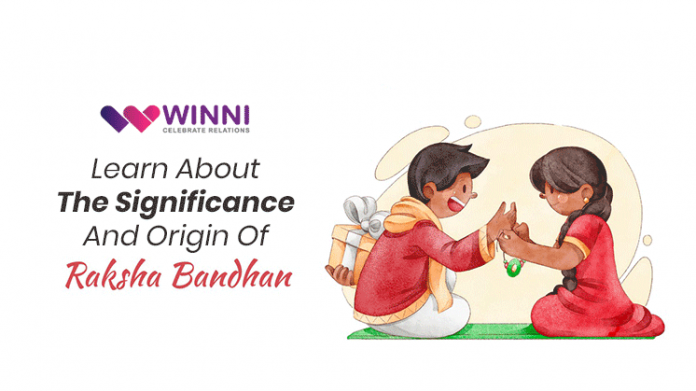Festivals in India are the commemoration of love, solidarity, and diversification. Festivals are an embodiment of brotherhood, affection, and sacred emotional principles. Raksha Bandhan honors the relationship of security among siblings. It is an occurrence to cherish care, love, and divine emotion of kinship.
Festivals remain deficient when there is an absence of people getting together, swapping gifts and sweets, and all kinds of enjoyment. Raksha Bandhan was a provincial celebration fundamentally pertaining to India’s western and northern precincts but soon developed into an indispensable tradition throughout the world, extolling this festival with the same vigor and enthusiasm.
On the festival day, women and girls arrange the ‘Pooja Thali’ with Turmeric, Diya, Rice, sweets, and Rakhi thread. The ceremony starts with prayers being made to God, after which women and girls tie Rakhi to their brothers and wish for their health and well-being. Brothers recognize this affection with a commitment to defend their sister all the time.
Sisters then tie Rakhi on their brother’s wrist while reciting mantras and applying Rice and Turmeric on their forehead as a sign to victory against the various conditions of life. The brothers then give Rakhi gifts to their sisters, signifying the recognition of her love and affection and his commitment towards their bond.
This festival has remained part of the Hindu culture for numerous millenniums. Nevertheless, the ways to exhibit love have evolved over the years with a different way of life to make the festival more exuberant. The growing gaps summon the urge to be united more powerfully with natural energy that pulls the siblings towards each other. The amenities like rakhis via the post, rakhi cards, and e-rakhis is a beneficial element of delivering the Raksha Bandhan greetings in the present world. Also, siblings who live away from each other and can’t meet one another for varied reasons send unusual gifts to each other through online rakhi delivery in Bangalore, Pune, Delhi, etc.
The significance of Raksha Bandhan
The Hindus extensively honor Raksha Bandhan in various regions of the country, including other nations like Mauritius, Pakistan, and Nepal. The Jain population also revered the festival, where Jain clerics offer formal rakhis to the followers. The Sikhs commemorate the celebration as Rakhardi or Rakhari and are devoted to the love and affection between brothers and sisters.
The importance of the festival is sharing the sacred relation among siblings. The old ritual of sisters tying a divine string on the brother’s wrist and the brother, in return, vowing to defend her with a feeling of faith and duty amongst the siblings. The presence of the custom exists in numerous mythological documents. The exact definition of ‘Raksha’ is ‘Protection’ and for ‘Bandhan’ is ‘A bond.’
Origin of the festival
The festival is assumed to have begun ages ago with numerous tales associated with the commemoration of the unusual festival.
As per the ancient story of Bhavishya Purana, a furious battle took place amidst the Gods and demons. Lord Indra, who is the God of thunderbolts, rains, and the sky was on the side of the Gods and was handling severe blows from the mighty demon, King Bali. However, the end of the war remained indecisive. So, Sachi, Indra’s wife, fearing for his life, went to meet Lord Vishnu and was granted a divine trinket made of cotton. Sachi tied the divine trinket around Lord Indra’s wrist, and he ultimately conquered the demons. The original records of the festival show that the divine strings were employed by women for prayers and were tied to their husbands as they left for war to portray as a symbol of strength. Not like the present times, where the divine strings are only confined to the relations of siblings.
According to the texts of Vishnu Purana and Bhagavata Purana, Lord Vishnu conquered all the three realms from King Bali and was requested by Bali to live along with him in the castle. Lord Vishnu honored his request and stayed with him. Nevertheless, Goddess Lakshmi, wife of Lord Vishnu, ached for him to retreat to Vaikuntha. So, Goddess Lakshmi visited King Bali and tied a Rakhi on his wrist. When the King asked what gift she would like in return, she asked for her husband’s freedom. The request was accepted by King Bali and allowed Lord Vishnu to return with his wife.




